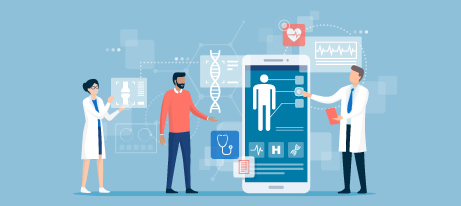
elenabs / iStock
Interest in medical and public health practices supported by mobile devices has exploded worldwide, as healthcare practitioners and patients alike increasingly rely on these devices to guide diagnostic and treatment decisions. Whether or not “mHealth” devices adds real value to patient care, however, is up for question. An article in Nature Digital Medicine found little data demonstrating that mHealth apps substantively contribute to patient care. “There are only a small number of clinical scenarios where published evidence suggests that mHealth apps may improve patient outcomes,” cautioned Simon P. Rowland, J. Edward Fitzgerald, Thomas Holme, John Powell and Alison McGregor, authors of the perspective piece that explores the clinical value of mHealth for patients, examining the uses, functionality, and limitations of specific apps and the need for additional research and standardized guidelines to improve their safety and efficiency.
The mHealth market is gaining worldwide influence: at least 2.5 billion people own a cellphone, and more than 50 million use an app-based self-triage device, with interactive symptoms generating the most interest as a diagnostic app.
mHealth serves at least four main functions:
- support clinical diagnoses and decisions;
- improve outcomes by supporting behavioral changes and compliance with established treatments;
- function as a self-contained digital therapeutic; and
- educate patients on disease and treatment options.
The authors stress the need for more clinical evidence to fully support mHealth, citing varying results from a host of studies. Research on diagnostic symptom checkers has shown that these apps may give the wrong advice or lead to unnecessary consultations in nonemergent care settings. Another trial on digital therapeutics showed no differences in patient outcomes between in-person delivery of therapy and an mHealth intervention. “As with other mHealth interventions further research is required to investigate whether successful clinical outcomes are sustainable long term,” the authors wrote. Research on the usability of individual mHealth apps on different patient populations is also lacking.
In certain scenarios, mHealth has shown potential in reducing morbidity and mortality outcomes. In one study, an app that screens for signs of disease recurrence outperformed standard imaging as far as improving survival rates in patients previously treated for lung cancer. The World Health Organization, which officially coined the definition of mHealth, “already advises that digital diagnostic platforms may be valuable for patients in low- and middle-income countries where expert clinical advice is difficult to access,” the authors noted.
Clinicians play an important role in advising patients on apps. With thousands of apps available for downloading, finding the right app for the right patient can be difficult. Patients may also differ with their physician on which app is appropriate for them. “Ideally, evaluation of an mHealth app should include assessment of the evidence for effectiveness, information governance and privacy, commissioning standards, regulatory (safety) standards, technical aspects such as the software itself, design, and interoperability standards from both patient and clinician perspectives,” the authors summarized.
Countries vary in their approval standards of such apps. In the United States, apps may gain marketing authorization or approval through the Food and Drug Administration’s 510K or de novo clearance pathways. The Federal Trade Commission in turn regulates any misleading claims made by an app. In the meantime, several major health organizations have collaborated on the Xcertia initiative, which seeks to promote safe and effective development of mobile health apps through operability, privacy, security, and content standards. Xcertia in 2019 issued mHealth app guidelines .
To assist clinicians and patients, Rowland and colleagues called for a standardized approach on approving and regulating mHealth apps in the United States. Clinicians often lack skills and training to help patients understand the privacy and technological considerations associated with these tools. “Current literature suggests that user factors such as a high level of engagement with an mHealth app are frequently associated with better outcomes and clinicians may be able to support patients by setting goals that are achievable for the individual in a defined time frame with scheduled follow-up,” the authors advised.
Looking ahead, clinical treatment pathways are likely to include evidence-based mHealth apps as a way to improve outcomes and access to certain specialized therapies. “There is huge potential for health data to be downloaded from mHealth apps and used to facilitate earlier detection of subclinical disease and support technology-assisted clinical decision making,” Rowland and colleagues predicted.